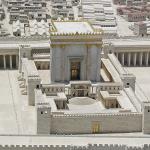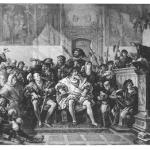While people try to find their balance after this morning’s seismic jolt in La Repubblica, at least one observer, Fr. Z., offers something firm to grab onto:
I think the Francis has a pretty good BS detector. He’ll need it.
Conscience…
Your Holiness you wrote that in your letter to me. The conscience is autonomous, you said, and everyone must obey his conscience. I think that’s one of the most courageous steps taken by a Pope.
“And I repeat it here. Everyone has his own idea of good and evil and must choose to follow the good and fight evil as he conceives them. That would be enough to make the world a better place.”
Is there more to say about “conscience”? You bet. Can it be said in an interview… this interview in this moment? Nope.
But let’s see if what Francis said has foundation in what the Church teaches:
Catechism of the Catholic Church
1800: A human being must always obey the certain judgment of his conscience.
Or:
1790: A human being must always obey the certain judgment of his conscience. If he were deliberately to act against it, he would condemn himself. Yet it can happen that moral conscience remains in ignorance and makes erroneous judgments about acts to be performed or already committed.
Or:
1782: Man has the right to act in conscience and in freedom so as personally to make moral decisions. “He must not be forced to act contrary to his conscience. Nor must he be prevented from acting according to his conscience, especially in religious matters.” (Dignitatis humanae 3 § 2.)
How about:
2106 “Nobody may be forced to act against his convictions, nor is anyone to be restrained from acting in accordance with his conscience in religious matters in private or in public, alone or in association with others, within due limits.” (DH 2 § 1) This right is based on the very nature of the human person, whose dignity enables him freely to assent to the divine truth which transcends the temporal order. For this reason it “continues to exist even in those who do not live up to their obligation of seeking the truth and adhering to it.” (DH 2 § 2)
I will add believers and Catholics are obliged to follow their FORMED consciences, and those consciences are enlightened by Divine Revelation, by apostolic tradition and by the Magisterium. Once again, His Holiness is right, but within the context that he had in mind, which context is only implicitly evident in the interview because of the nature of that genre.
Could Francis be faulted for not talking about defective conscience or lack of formation of conscience, I suppose. But the Church teaches that people cannot be coerced in matters of conscience. This is a natural right as well. But the context here is non-believers. When the LCWR nuns try to cite Dignitatis humanae as an excuse to not obey, they err and err gravely. But the Pope was talking with a non-believing journalist, not LCWR nuns.
Context, friends, context.
Stay tuned. More reaction to come. And read the rest.
UPDATE: It appears the folks at La Repubblica may not have been as careful in their translation as the folks at America. Nun Blog notes:
I’ve only scanned the interview and found two eyebrow-raisers. A bit of research into the Italian original showed me that both are translation issues. And serious ones, to my mind. (What? Did they use Google Translate?) So I am going to just hurry to post the differences between the English as published and my own rather literal Italian.
If “everyone has his own idea of good and evil and must choose to follow the good and fight evil as he conceives them,” is the Pope saying that there is no such thing as objective truth, or objective right or wrong? This is where it is really, really helpful to know Italian: “Ciascuno di noi ha una sua visione del Bene e anche del Male. Noi dobbiamo incitarlo a procedere verso quello che lui pensa sia il Bene” is more literally (and helpfully?) translated as “Each one of us has his/her own vision of the Good or even of Evil. We must encourage him/her to move toward that which he/she sees as the Good.” The Pope is not leveling the difference between truth and untruth, right and wrong: he is saying that we all have a duty to encourage people to pursue the Good, knowing that the true Good will not fail to manifest himself, even if “through a glass darkly.”
Here’s another whopper: “The Son of God became incarnate in the souls of men to instill the feeling of brotherhood.” Um, the Son of God did not become incarnate in souls. He became incarnate in human nature, in his own human flesh and blood. The Italian is ” Il Figlio di Dio si è incarnato per infondere nell’anima degli uomini il sentimento della fratellanza”: “The Son of God became incarnate to infuse into the soul of men [could say “the human soul”] the feeling of brotherhood.”
Take the rest of the interview with a grain of salt–and with the Catechism at hand, knowing–as Pope Francis told Father Spadaro– that he is a “son of the Church” and that everything he says should be interpreted in the light of Church teachings.
UPDATE II: John Thavis has this characteristically astute observation:
In beginning a face-to-face dialogue with Eugenio Scalfari, the founder of the Rome newspaper La Repubblica, the pope made it clear that he was not simply conducting an intellectual exercise with one of Italy’s best-known atheists.
In his own gentle way, he reached out to Scalfari, probing the journalist’s beliefs and asking him at one point: “Do you think we are very far apart?”
The two will no doubt meet again. I think the pope will continue to conduct this very public conversation with the idea of inspiring similar bridge-building efforts throughout the church.















